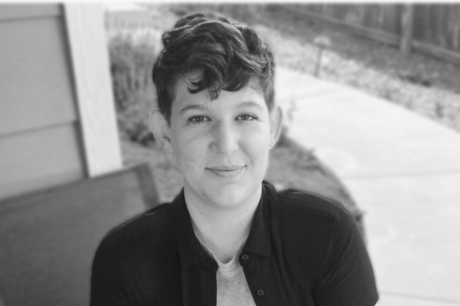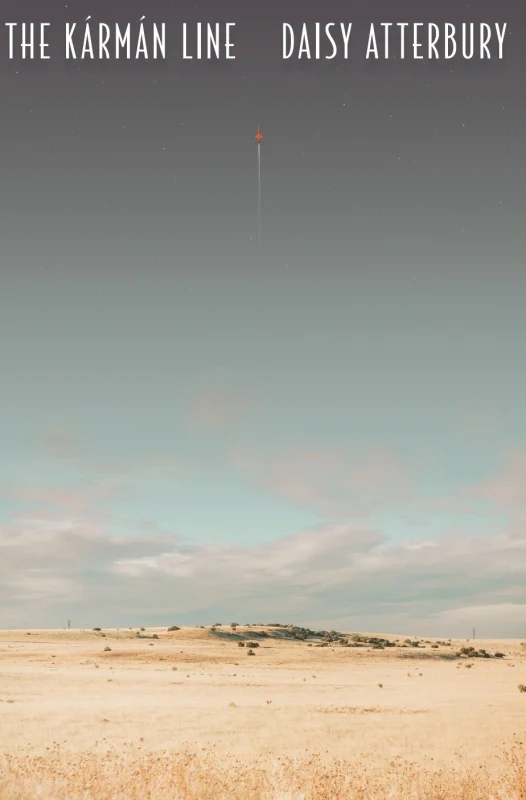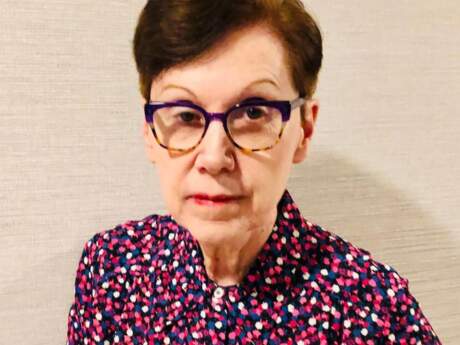In Their Own Words
Daisy Atterbury on “Our object of focus requires living”

Our object of focus requires living
She writes, “The West begins
where the average annual rainfall
drops below 20 inches.” Which is
Joan Didion quoting Bernard DeVoto
but I think the West begins
beyond repair, a salivating Crispr
of relational beef
There’s no way I say
We can erase the past by
Earning
Baldwin says look at your dark dreams
I unfold one
suck the winter out of my legs
—Oh she means North American
Clickbait
Live on national
There’s movement in the channels
behind the drywall. There’s
something scratching
any affinity
any shelter
What’s binary except
your number?
I’m standing in line
Here
I’m calling you back
Reprinted from The Kármán Line (Rescue Press, 2024) with the permission of the author.
On “Our object of focus requires living”
I’ve been living in the area known as the American Southwest as long as I can remember, subject to its fantasies of space as uncharted territory, its constructs of multicultural ease, and its tourists, so many—all under an average of 7 annual inches of rain (fuck California’s 20!). We used to give people wrong directions as teens in Santa Fe, cackling as if we stuck it to the man. We pressed flowers in library books in secret—and some beetles. Santa Fe, where ladies who look like Meryl Streep descend, a few times a year, to churn the economy into bread.
I’ve always aligned my poetry against the border town’s siren song of peaceful multicultural living, looking instead to the cracks in the story, which split into fissures of pain. The difference here is colonial. An anxiety pervades this place. What will sustain us all, if not for the Meryls? The town asks. “There’s movement in the channels / behind the drywall. There’s / something scratching.”
Jennifer Denetdale, at the University of New Mexico, recently curated a show at the Maxwell Museum of Anthropology in New Mexico, exhibiting newly discovered photographs by Milton Snow. Snow was a US Agent hired by the Navajo Service to photograph Navajo lands under Indian Commissioner John Collier’s Livestock Reduction Policies of the 1930s and 40s. The photographs show placid scenes of land and inhabitants, supposed evidence of the success of the policy to slaughter herds of sheep to transition Navajo people away from traditional life into American land use ideals. This domestic assimilation was to produce citizenry and facilitate “modernity.” But every frame has its outside.
And every poem has its frame.
My poem begins with Joan Didion, quintessential “Lily of the West.” Her 1977 essay, “Holy Water” opens this poem, quoting Bernard DeVoto. Who? I had to research, but he’s an American historian, conservationist, and Harper’s essayist who wrote “The West Against Itself” (1947), a piece that broke the story of Nevada Senator Pat McCarran’s vote to undermine the public lands system in Nevada through a mass transfer of federal lands back to the state, where they could then be sold to developers. 146 million acres. DeVoto was against this “plunder,” “The West Against Itself.”
But Devoto had his own moral constraints, his pristine and empty American “wilderness.”
His own frame.
Before I lived in Santa Fe, I grew up as a child in Shiprock, New Mexico, on the Navajo Nation. Then I moved to Santa Fe. Then Albuquerque. These places are codes and details that mean something to someone here, someone there, maybe no one else. The Southwest has provided that rough and unpaved lane for grappling with my identity as a writer—my sexuality, gender, race, status as a settler, all misalignments of place I once organized into a life of disavowal. “Not-it!” I would yell. Not. It.
I’m partial to this less-than-popular song by Bob Dylan (Track 1 on Dylan, 1973):
She robbed me of my liberty
Deprived me of my rest
Then go, my lovely Flora
The lily of the West
“There’s no way I say / We can erase the past by / Earning,” I write here now.
And in my poetry, here and in The Kármán Line, I think about porosity and borders, and how we’re conditioned by an American obsession with earning. Speaking of capitalism, but also of morality. We don’t, can’t keep organizing ourselves around “earning” in that Calvanist sense, striving for the moral, the righteous, or the “good.” It’s too bunked, that life, all tied up in a quiet rigidity that stamps out the living. For me, poetry is about something else: returning to the sources of pain, rift, curiosity, identity and affinity. And to all those unrighteous dark dreams. Thus I suppose land, and the fantasies of its uses, the realities of its abuses, are this poem’s ratcheting agent—the place to return and grapple. To take American “goodness” out of the equation, and to orient to space a different way. I keep coming back. I scrape away the pretty parts, at least I want to.
So I take a number. Maybe I take yours.



